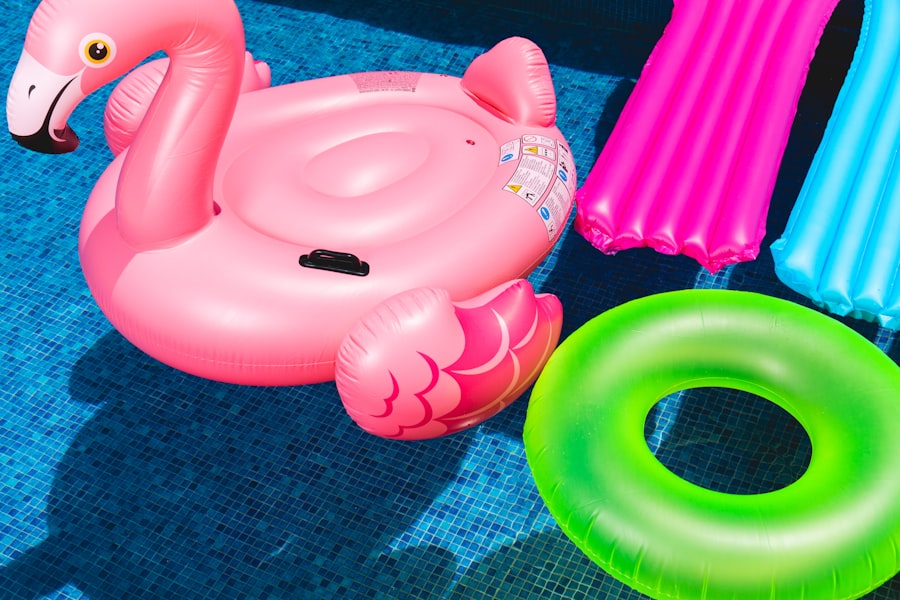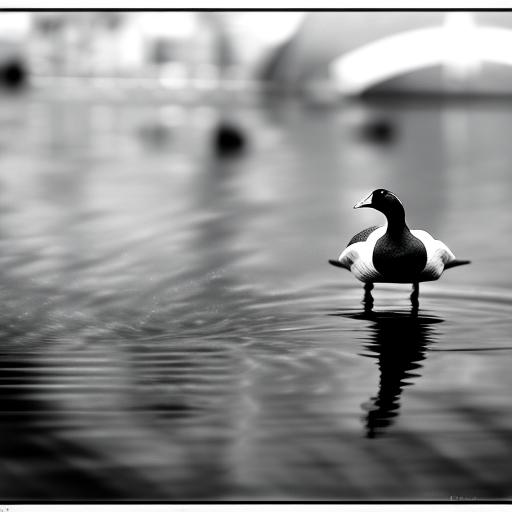Geese around pools can be a nuisance for many homeowners. They leave behind droppings that can be unsightly and unsanitary, and they may also damage the pool area with their constant presence. Finding effective solutions to keep geese away from pools is essential for maintaining a clean and enjoyable outdoor space. In this article, we will explore various methods to deter geese from pools, including installing a pool cover, using motion-activated sprinklers, setting up decoy predators, creating physical barriers, implementing sound-based deterrents, removing food sources, planting vegetation that geese dislike, using netting, and seeking professional assistance.
Key Takeaways
- Geese are attracted to pools because they provide a source of water and food.
- Installing a pool cover can deter geese from landing and swimming in your pool.
- Motion-activated sprinklers can scare geese away from your pool area.
- Setting up decoy predators, such as fake owls or snakes, can keep geese at bay.
- Creating a physical barrier, such as a fence or hedge, can prevent geese from accessing your pool area.
Understanding the Behavior of Geese Around Pools
Geese are attracted to pools for several reasons. Firstly, pools provide a source of water for drinking and bathing. Secondly, the surrounding grass and vegetation near the pool area offer a food source for geese. Additionally, geese are social animals and are often drawn to areas where they see other geese congregating. Once geese find a pool that meets their needs, they tend to return to the same location repeatedly.
When geese are around pools, they can cause various problems. Their droppings not only create an unsightly mess but also pose health risks as they can contain harmful bacteria. Geese may also damage the pool area by scratching or pecking at surfaces or vegetation. Furthermore, their constant presence can make it difficult for homeowners and their guests to enjoy the pool area.
Installing a Pool Cover to Deter Geese
One effective solution for keeping geese away from pools is to install a pool cover. A pool cover not only prevents geese from accessing the water but also eliminates the attraction of the pool as a drinking or bathing source. Additionally, a pool cover can help keep the pool clean by preventing debris from falling into the water.
When choosing a pool cover, it is important to select one that is durable and can withstand the elements. Look for covers made from high-quality materials such as reinforced vinyl or mesh. The cover should be securely fastened to the pool to ensure that geese cannot slip underneath it. It is also essential to regularly inspect and maintain the pool cover to ensure its effectiveness.
Using Motion-Activated Sprinklers to Scare Geese Away
Motion-activated sprinklers are another effective method for deterring geese from pools. These devices work by detecting movement and then spraying a burst of water in the direction of the movement. Geese are startled by the sudden spray of water and are discouraged from returning to the area.
When choosing motion-activated sprinklers, opt for models specifically designed for deterring geese. These sprinklers typically have a wider range and more powerful spray than regular sprinklers. It is important to position the sprinklers strategically around the pool area to cover all potential entry points for geese. Regularly check and maintain the sprinklers to ensure they are functioning properly.
Setting Up Decoy Predators to Keep Geese at Bay
Using decoy predators is another effective method for scaring geese away from pools. Geese are naturally wary of predators, and the presence of decoys can create a sense of danger that deters them from approaching the pool area.
Decoy predators can take various forms, including plastic owls, coyotes, or even alligators. Place these decoys strategically around the pool area, making sure they are visible to geese from different angles. It is important to periodically move the decoys to prevent geese from becoming accustomed to their presence.
Creating a Physical Barrier Around Your Pool

Creating a physical barrier around your pool is an effective way to prevent geese from accessing the area. Fencing or netting can be used to create a barrier that geese cannot easily cross.
When choosing a fence or netting, opt for materials that are sturdy and difficult for geese to penetrate. Fences should be at least four feet high to prevent geese from flying over them. Netting should be tightly woven to prevent geese from getting tangled in it. It is important to regularly inspect and maintain the barrier to ensure its effectiveness.
Implementing Sound-Based Deterrents to Keep Geese Away
Sound-based deterrents can be an effective method for scaring geese away from pools. These devices emit loud noises or predator calls that create a sense of danger and discourage geese from approaching the area.
When choosing sound-based deterrents, opt for models specifically designed for deterring geese. These devices often have adjustable volume settings and can be programmed to emit different sounds at varying intervals. It is important to position the deterrents strategically around the pool area to cover all potential entry points for geese. Regularly check and maintain the devices to ensure they are functioning properly.
Removing Food Sources to Discourage Geese from Visiting
Removing food sources is an essential step in discouraging geese from visiting your pool area. Geese are attracted to areas where they can find ample food, so eliminating these food sources can make your pool area less appealing to them.
Identify any sources of food near your pool, such as grass clippings, fallen fruit, or bird feeders, and remove them. Regularly clean up any debris or food scraps in the pool area that may attract geese. Additionally, consider using landscaping techniques that discourage the growth of grass or vegetation that geese find appealing.
Planting Vegetation That Geese Dislike Around Your Pool
Planting vegetation that geese dislike around your pool can be an effective way to deter them from visiting the area. Geese prefer open spaces with short grass where they can easily spot predators, so planting tall or dense vegetation can make your pool area less attractive to them.
Choose plants that have prickly or thorny leaves, as geese are less likely to graze on these types of plants. Some examples include holly bushes, rose bushes, or ornamental grasses. It is important to regularly maintain and prune the vegetation to ensure it remains effective in deterring geese.
Using Netting to Cover Your Pool and Keep Geese Out
Netting can be an effective method for preventing geese from accessing your pool. By covering the entire pool area with netting, you create a physical barrier that geese cannot easily penetrate.
When choosing netting, opt for materials that are sturdy and difficult for geese to tear or break through. The netting should be securely fastened around the perimeter of the pool to ensure that geese cannot slip underneath it. Regularly inspect and maintain the netting to ensure its effectiveness.
Seeking Professional Assistance to Manage Geese Infestations
If you are dealing with a severe geese infestation around your pool, it may be necessary to seek professional assistance. Pest control companies or wildlife management services can provide expert advice and implement effective strategies for managing geese infestations.
When choosing a professional service, look for companies with experience in dealing with geese infestations. They should have a thorough understanding of geese behavior and be knowledgeable about the most effective methods for deterring them. Additionally, consider reading reviews or asking for recommendations from friends or neighbors who have dealt with similar issues.
Geese around pools can be a persistent problem for homeowners, but there are various solutions available to deter them. Installing a pool cover, using motion-activated sprinklers, setting up decoy predators, creating physical barriers, implementing sound-based deterrents, removing food sources, planting vegetation that geese dislike, using netting, and seeking professional assistance are all effective methods for keeping geese away from pools. By taking action to prevent geese infestations, homeowners can maintain a clean and enjoyable outdoor space.
If you’re tired of dealing with geese invading your pool, you’ll want to check out this informative article on how to keep geese out of your pool. It offers practical tips and strategies to deter these feathered intruders from turning your pool into their personal playground. Additionally, if you’re interested in learning more about geese and their dietary habits, you might find this article on whether geese can eat chicken feed intriguing. For those who are considering raising chickens, the Producers Pride Sentinel Chicken Coop is a must-read. And if you’re curious about turkey breeding, don’t miss the article on the mating season for turkeys.
FAQs
What are some common reasons why geese are attracted to pools?
Geese are attracted to pools because they provide a source of water for drinking and bathing. Additionally, the surrounding grass and vegetation near the pool can provide a food source for geese.
What are some potential problems caused by geese in pools?
Geese can leave behind droppings that can contaminate the pool water and surrounding area. They can also cause damage to pool covers and equipment. In addition, geese can be aggressive and pose a safety risk to humans and pets.
What are some effective ways to keep geese out of a pool?
Some effective ways to keep geese out of a pool include installing a fence or barrier around the pool area, using decoys or scare tactics, and removing any food sources or nesting materials in the area. It is also important to regularly clean and maintain the pool to discourage geese from using it as a water source.
Are there any humane methods for keeping geese away from a pool?
Yes, there are several humane methods for keeping geese away from a pool. These include using noise deterrents, such as air horns or whistles, and using visual deterrents, such as reflective tape or balloons. It is important to avoid using harmful or lethal methods, such as poisons or traps.
What should I do if I encounter an aggressive goose near my pool?
If you encounter an aggressive goose near your pool, it is important to stay calm and avoid approaching the bird. Give the goose plenty of space and try to move away slowly. If the goose continues to be aggressive, contact a wildlife professional for assistance.
Meet Walter, the feathered-friend fanatic of Florida! Nestled in the sunshine state, Walter struts through life with his feathered companions, clucking his way to happiness. With a coop that’s fancier than a five-star hotel, he’s the Don Juan of the chicken world. When he’s not teaching his hens to do the cha-cha, you’ll find him in a heated debate with his prized rooster, Sir Clucks-a-Lot. Walter’s poultry passion is no yolk; he’s the sunny-side-up guy you never knew you needed in your flock of friends!







